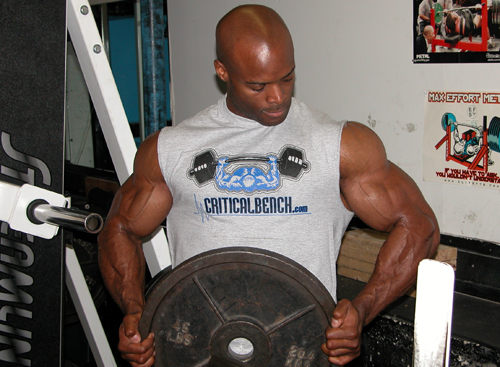All muscle is not created equal. It's not something most people give much thought to, but if you're really serious about gaining lean mass, you should. A little knowledge about the different muscle fiber types can go a long way in helping to improve your gains in both size and strength.
First, there are three different types of muscle fiber in our bodies: Type I, Type IIa and Type IIb. Each of these reacts to the "stress" of weight training or exercise differently. The type I fiber is known as a slow-twitch (ST) fiber, meaning that it contracts slowly. Slow-twitch fibers also have a high resistance to fatigue. Both of the type II fibers are fast-twitch fibers (FT-A and FT-B), meaning that they have a quicker contraction time than type I fibers. But unlike type I fibers, they have a low resistance to fatigue.
So what does all this mean and how is it going to help you? The specific combination of muscle fiber types that make up individual muscles determines how each person adapts to weight training. That's why it's easier for some guys to gain muscle than others. Guys who are high in slow-twitch fibers and lower in both the fast-twitch fibers tend to be your long-distance runners and swimmers. That's because of slow-twitch fibers' high resistance to fatigue-they're ideally suited for long-term aerobic activities.
Conversely, guys who are high in fast-twitch fibers and lower in slow-twitch fibers would find it very difficult to run a marathon. These are the guys who are better suited to weight training. The body's composition of fast-twitch A and fast-twitch b fibers will impact the particular type of weight training activities that are the best match for each person. Fast-twitch B fibers produce more power than fast-twitch A and slow-twitch fibers. But, they are also highly sensitive to fatigue so they're recruited when doing explosive movements that aren't sustained for long periods. Fast-twitch A fibers produce more power than slow-twitch fibers but nothing like fast-twitch B-some people refer these fibers as a "hybrid," because they've got characteristics of both.
A Test To Determine What Types Of Fibers Make Up Your Muscle Composition
Unfortunately, the only definitive way to determine exactly what types of fibers make up your muscle composition is with an invasive biopsy. However, there is a way to indirectly get an idea about the fiber composition of your muscles. First, you need to establish your one-rep max (the most weight you can lift for one complete rep). Then, drop the weight down to 80% of your one-rep max and determine how many reps you can do. If you can do more than 12, then you're composition is made up of more than 50% slow-twitch fibers. If you can do less than 7 reps, then your muscle group is likely composed of more than 50% fast-twitch fibers. If you hit somewhere between 7-12 reps, then it's probably an equal split between the two.
The specific combinations of muscle fiber types found in each person are determined by genetics. These are things we can't change about ourselves. What can be done though is that you can tailor your training to focus on developing particular types of
 muscle fibers-regardless of your combination. Training can not change a muscle fiber from one type to another but it can increase the amount of space a fiber type takes up in a muscle group.
muscle fibers-regardless of your combination. Training can not change a muscle fiber from one type to another but it can increase the amount of space a fiber type takes up in a muscle group.
For example, a guy who is high in slow-twitch fibers and low in both fast-twitch types can mix in some high intensity weight training (heavier weights, lower reps) to focus on developing the fast-twitch B fibers. When you train with heavy weights, you recruit-and develop-the fast-twitch B fibers. Exactly how much weight you lift and how many reps you do will be determined by whether your focus is on increasing strength or gaining size.
Similarly, someone who is highest in fast-twitch B fibers can develop his slow-twitch fibers somewhat by mixing in some extended periods of cardio. Weight training with a low or moderate intensity (lighter weights/higher reps) recruits almost entirely fast-twitch A fibers. These are the exercises and fibers that you focus on when your goal is to tone up your body, not go for big gains in size or strength.
In closing, this basic understanding of the different muscle fiber types combined with a little bit of self-knowledge about your particular combination can help you tailor a training routine that emphasizes your natural abilities while also enabling you to develop your other attributes, making for a well-rounded routine that will help you to achieve your specific goals.
More Information About Muscle Building Click Here
Source 4 Foods Never To Eat


No comments:
Post a Comment